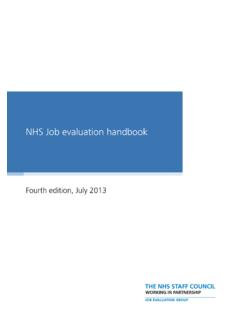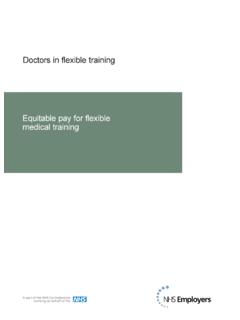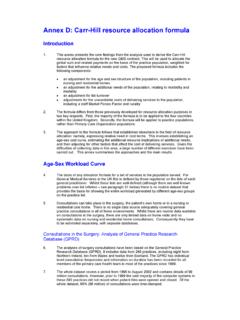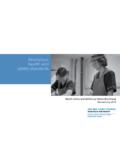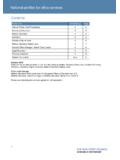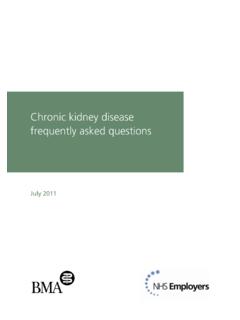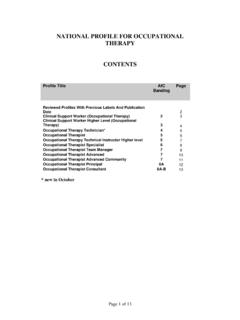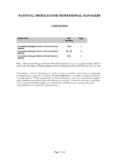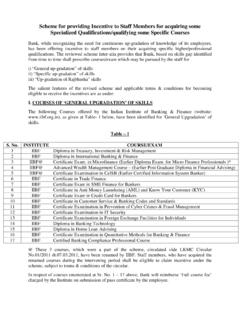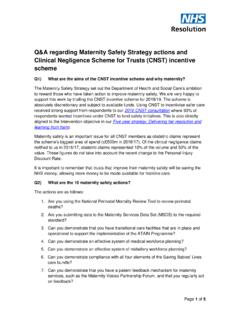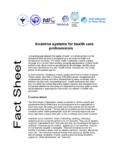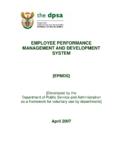Transcription of The GP practice - NHS Employers
1 The GP practice A guide for community pharmacists and pharmacy staff August 2013. Contents Section 1 About this guide 3. Section 2 Qualifying for general practice 4. Education and training 4. Extending skills 4. The work of a GP 5. Section 3 Key national bodies 5. Section 4 NHS contracts for primary medical services 6. Contractual routes 6. The GMS contract 6. Funding for GMS practices 7. The Quality and Outcomes Framework (QOF) 9. Section 5 Running a general practice 11. Roles within general practice 11. Structures 14. Clinical Commissioning Groups (CCGs) 14. Section 6 The GP practice prescribing budget 15. Budget setting methodology 15. Prescribing strategies 15. Section 7 GPs investing in the future 18. Section 8 Frequently asked questions 18. 2. The GP practice A guide for community pharmacists and pharmacy staff Section 1. About this guide This guide aims to support General Practitioners (GPs) and community pharmacists in developing more effective working relationships and in turn, improve primary care services for patients.
2 It covers key areas such as funding arrangements for practices , the impact of the Quality and Outcomes Framework (QOF), prescribing budgets and policies, and the range of clinical and administrative functions that practices currently provide. The document has been developed jointly by NHS Employers , the British Medical Association's General Practitioners Committee (GPC) and the Pharmaceutical Services Negotiating Committee (PSNC). A similar guide has been produced for GPs to give them an insight into the working life of a community pharmacist, pharmacy services and an overview of the community pharmacy contractual framework. Together, these guides will support the two professional groups as well as provide an insight for NHS commissioners, as new ways of integrated working in primary care start to take shape. 3. The GP practice A guide for community pharmacists and pharmacy staff Section 2. Qualifying for general practice Education and training Undergraduate degree course Full professional registration with Five years covering competencies General Medical Council (GMC).
3 Required for general medicine and surgery. General practice training programme A three year GP specialty training programme competency and Postgraduate training assignment based to gain membership of programme the Royal College of General Practitioners (MRCGP). Two years of foundation training including at least three months in general medicine and three months in general surgery under a Continuing professional development (CPD). provisional professional registration All GPs have an annual appraisal and must with the General Medical Council complete and record CPD activity to develop (GMC). their knowledge, skills and competencies relevant to their field of expertise. Revalidation and recertification GPs will collect evidence to support their professional revalidation and recertification. The first cycle of revalidation takes place from December 2012 to March 2016. Extending skills A small number of GPs have taken additional qualifications to become GPs with Special Interests (GPwSI).
4 This initiative is part of a wider drive to redesign NHS care around the treatment of long-term conditions in the community. Further details on the special interest frameworks can be found on the Primary Care Commissioning website1. 1. Primary Care Commissioning GPs and pharmacists with special interests: 4. The GP practice A guide for community pharmacists and pharmacy staff The work of a GP. The modern GP looks after a range of chronic conditions that were previously cared for in hospital clinics such as hypertension, diabetes, Chronic Obstructive Pulmonary Disease (COPD) and asthma. GPs must have a broad knowledge covering all medical and surgical specialties, dealing with undifferentiated illness, often at an early stage. To cope with this increasing complexity, larger practices will have a lead GP for certain conditions although all the GPs continue to deal with the full range of illnesses. Preventative medicine is much more prominent and GPs are now resourced to case-find and treat many chronic conditions at an early stage, before complications have arisen.
5 Section 3. Key national bodies There are several national organisations that have key roles in general practice : The General Medical Council (GMC) registers doctors to practice medicine in the UK. Its core guidance Good Medical practice was updated in 2013 and sets out the principles and values of good practice . The Royal College of General Practitioners (RCGP) has many leadership functions. In particular it devises and updates the GP training programme and develops new qualifications and methods of assessment. The British Medical Association (BMA) is both a professional body and the main doctors' trade union. The General Practitioners Committee (GPC) of the BMA negotiates terms and conditions of service for all GPs contracted to deliver services under the General Medical Services (GMS) contract, both BMA members and non-members. 5. The GP practice A guide for community pharmacists and pharmacy staff Section 4.
6 NHS contracts for primary medical services Contractual routes There are three contractual routes that NHS England can use to commission primary medical services for the population: Contract Details General Medical Services This is a nationally directed contract between NHS. (GMS) contract England and a practice . The new GMS contract (see ) was introduced in April 2004. Currently, about 60 per cent of practices are on GMS contracts. Personal Medical Services This is a local contract agreed between NHS. (PMS) contract England and the practice , together with its funding arrangements. In England, approximately 40 per cent of practices are on PMS contracts. The GMS. contract has a strong influence on the content and scope of this contract. Alternative Provider Medical This allows NHS England to contract with any Services (APMS) contracts person' under local commissioning arrangements. The GMS contract Type of services What they cover Essential services must be This includes the management of patients who are provided by all contractors.
7 Ill or who believe themselves to be ill with acute, chronic or terminal conditions. Additional services normally This includes cervical screening, contraceptive provided by all contractors but services, childhood vaccinations and immunisations, practices can opt-out of child health surveillance and maternity services. providing the services. Enhanced services practices Enhanced services that are nationally commissioned can choose whether or not to through the GP contract by NHS England and provide these services. legally directed by the Secretary of State are known as Directed Enhanced Services (DESs). Community based services From 1 April 2013, money previously allocated by may be commissioned from PCTs for enhanced services transferred to CCGs practices or other qualified (except for public health local enhanced services providers. funding, which has been allocated to Local Authorities). 6. The GP practice A guide for community pharmacists and pharmacy staff Type of services What they cover CCGs may choose to use these resources to reflect local needs and priorities, including commissioning additional community based services (which can be provided by GP practices or other qualified providers under NHS standard contracts).
8 Transitional local enhanced Before 1 April 2013, some enhanced services were services (for 2013/14) specified and commissioned locally by PCTs more commonly known as local enhanced services (LESs). Responsibility for such services which did not expire on or before 31 March 2013 transferred to NHS. England. NHS England has directed CCGs to manage these services, now known as transitional enhanced services, on its behalf. Mid year review points were included in the transfer arrangements giving CCGs the opportunity to decide how to use the funding beyond this point. Local improvement schemes CCGs do not have powers in their own right to pay for improvements in services provided under the GP. contract. CCGs can, however, apply to the relevant NHS. England area team for delegated powers to use resources from their budget to pay for improvements in services provided under their GP. contract or to support activities such as clinical audit or peer review.
9 Funding for GMS practices Major funding streams There are several major funding streams for GMS practices : Funding stream Details The global sum funds a The bulk of these payments are determined by an practice for delivering essential allocation formula which funds practices based on and additional services to its practice workload and circumstances (including registered list of patients. patient demographics such as need (morbidity and mortality), age and gender). Minimum practice Income This was introduced when the contract payment Guarantee (MPIG) is a structure changed in 2004. Payments made under financial protection scheme MPIG are called correction factor payments. From which many practices currently 2014/15 funding to general practice will move receive additional income from. towards equitable funding over a seven year 7. The GP practice A guide for community pharmacists and pharmacy staff Funding stream Details period.
10 MPIG payments will be taken into account, gradually phasing them out. The Quality and Outcomes The QOF measures practice achievement against Framework (QOF) is a evidence based clinical, public health, quality and voluntary scheme that provides productivity and patient experience indicators. funding to support aspiration to Although voluntary, the majority of practices and achievement of a range of participate. practices score points according to their quality standards, by rewarding levels of achievement and payments are calculated practices for the volume and on the points the practices achieve. In 2013/14, quality of care delivered to their practices can achieve a maximum of 900 QOF. patients. points, although payments will vary with the size of the practice and the prevalence of medical conditions for that practice 's population, to reflect the workload involved. For more details see the section on QOF below.
